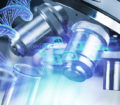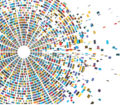For too many of us, weekends include happy hours, boozy brunches, and questionable decisions. We know alcohol affects our judgement, but, in the moment, we feel like we’re rational and in control. A recent study by psychologists at San Diego State University delves into the reasons for this phenomenon.
The study found that alcohol’s effect on cognition may have something to do with brain waves called beta and theta oscillations. Theta waves help different parts of the brain communicate during decision-making. Beta waves play a role in motor control.
The team, led by Ksenija Marinkovic, director of SDSU’s Spatio-Temporal Brain Imaging Laboratory, came to this conclusion after measuring the cognitive control of 18 volunteers while distracted, and for some, a little buzzed. They were monitored by a brain-imaging machine while watching a screen showing a series of colored squares on either side and in the middle. They were directed to ignore the squares on the side and press a button corresponding to the color of the middle square. It turns out, the side squares, referred to as “flankers,” weren’t so easy to ignore, and elicited an automatic motor response before the actual target appeared.
As expected, the task became harder after alcohol was added to the mix. Accuracy in choosing colors fell by about five percent whenever the flanker squares didn’t match the target square. However, reaction time stayed about the same. Researchers noted that after participants drank, the frequency of their theta waves dropped—meaning their decision-making was impaired—but their beta waves seemed about normal. The combined results suggest the brain still thinks it’s making the right choices, even though its ability to do so is impaired.
That could be an especially dangerous combination behind the wheel, Beaton said.
“When driving, we usually operate on auto-pilot, going through the motions automatically and without much conscious thought,” she said. “However, occasionally we have to quickly react to stimuli, such as when a car cuts you off.”
Cognitive control is what helps drivers safely navigate unexpected hazards. “But when drivers are intoxicated, they are less successful at making these quick changes,” Beaton said.






























